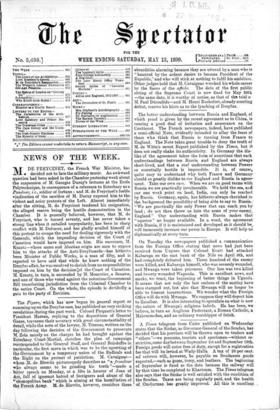NEWS OF THE WEEK.
YEDE FREYCINET, the French War Minister, has • decided not to face the military music. An awkward question had been asked in the Chamber yesterday week about the suspension of M. Georges Duruy's lectures at the Ecole Polytechuique, in consequence of a reference to Esterhazy as a flandour, i.e., soldier of fortune ; and M. de Freycinet's feeble vindication of the sacrifice of M. Duruy exposed him to the violent and noisy protests of the Left. Almost immediately after the sitting, M. de Freycinet tendered his resignation, the alleged reason being the hostile demonstration in the Chamber. It is generally believed, however, that K de Freycinet, who is turned seventy, and has never taken a strong line when it entailed unpopularity, has been in sharp conflict with M. Delca.sse, and has gladly availed himself of this pretext to escape the need for dealing rigorously with the Generali, which the impending decision • of the Court of Cessation would have imposed on him. His successor, M. Krantz—whose name and Alsatian origin are sure to expose him to the attacks of the Anti-Dreyfusards—has hitherto been Minister of Public Works, is a man of fifty, and is reported to have said that while he knew nothing of • the Dreyfus affair, he was resolved to shrink from no responsibilities imposed on him by the decisionlof the Court of Cessation. M. Krantz, in turn, is succeeded by M. Monestier, a Senator, and one of those who voted against the notorious Government Bill transferring jurisdiction from the Criminal Chamber to the entire Court. On the whole, the episode is decidedly a gain to the party of Revision.






































